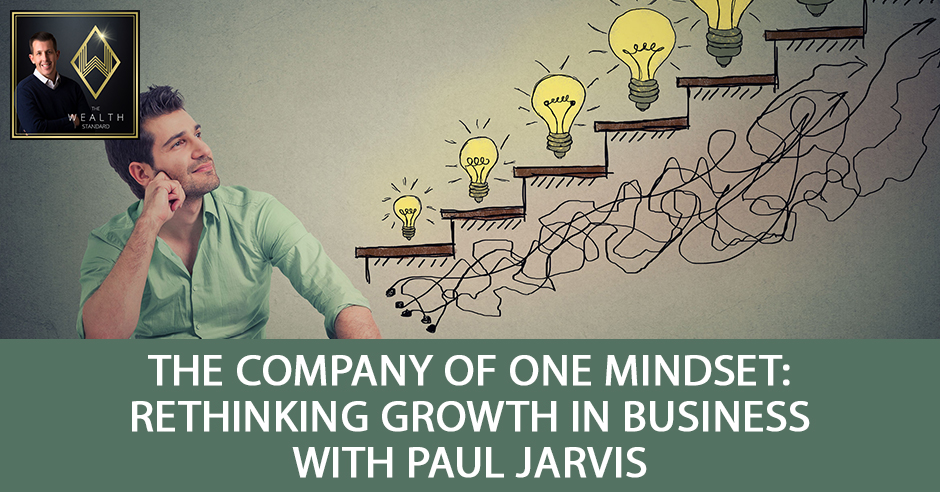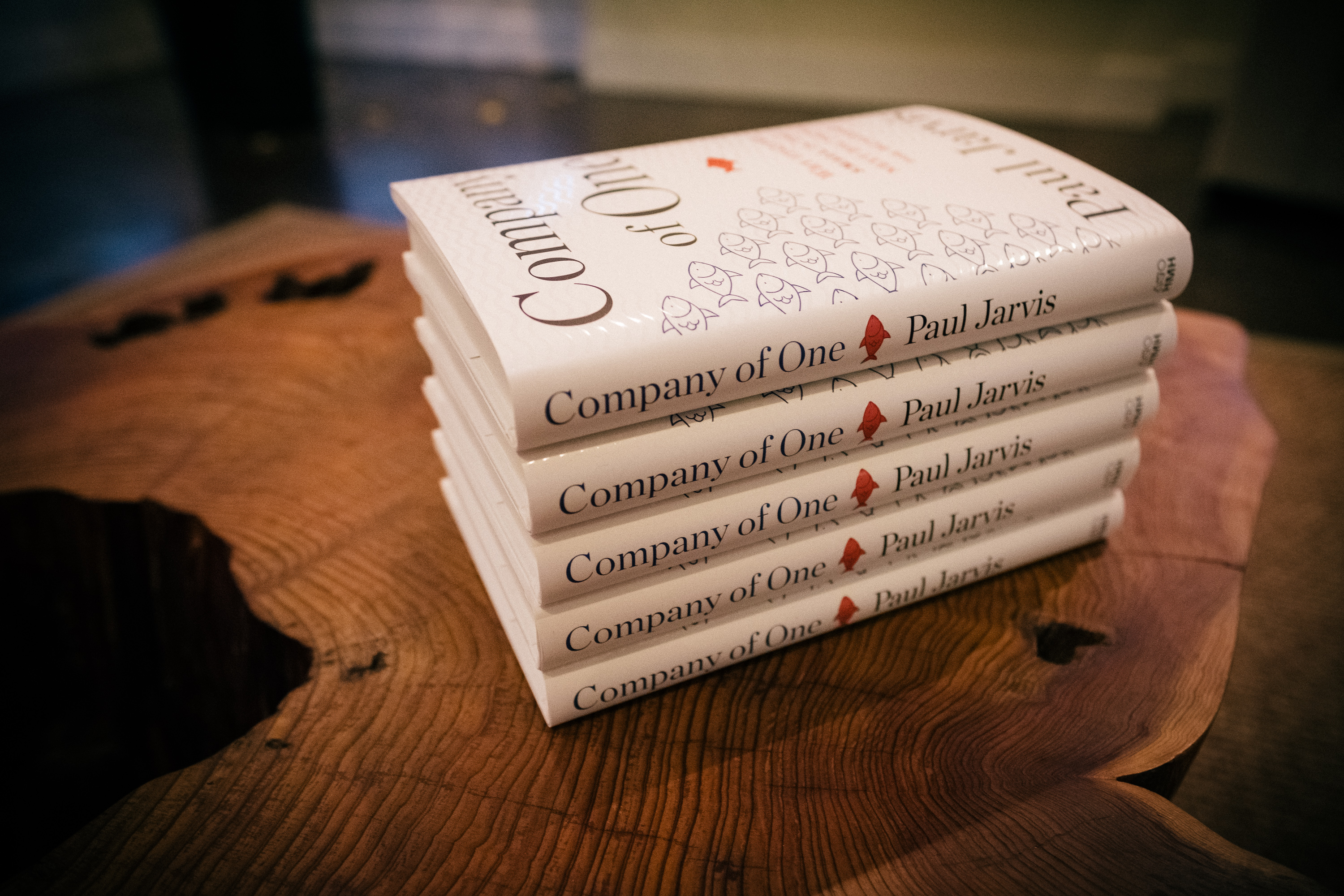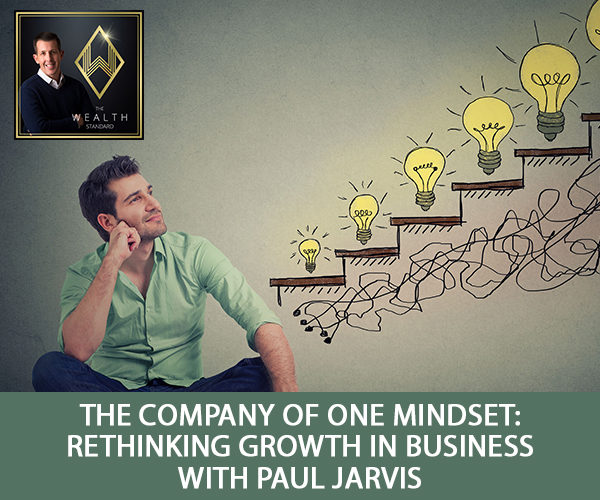The Company Of One Mindset: Rethinking Growth In Business with Paul Jarvis
Podcast: Play in new window | Download

—
Watch the episode here:
Listen to the podcast here:
The Company Of One Mindset: Rethinking Growth In Business with Paul Jarvis
The guest that I am interviewing for this episode is Paul Jarvis. It’s going to be a great interview, especially because we’re talking about entrepreneurship. He is a writer and designer who has his own company. He’s been an entrepreneur for several decades and his latest book is called Company of One. It explores this idea of efficiency and why bigger isn’t always better in business. He’s worked and consulted with some high-level athletes, including Steve Nash and Shaquille O’Neal and also has consulted with some big corporation clients, Microsoft and Mercedes, to be specific. I believe that he has had insight into what works and what doesn’t and that’s why I’m excited for you to learn from him. He is teaching a lot of these principles through his online courses. He also does lots of podcast interviews and he also has some software available. Without further delay, here’s my interview with the entrepreneur, Paul Jarvis.
—
Paul, thanks for joining me. I’m excited because I think you have a unique perspective on how entrepreneurs operate in our evolving economy and society. Welcome to the show. Maybe start off by giving us an idea of who you are and what your story is.
I’m Paul Jarvis. I’m the author of a book called Company of One. I’ve worked for myself for many years. I’ve done everything from design and consulting to companies like Microsoft to Shaquille O’Neal, which seems to span in a lot of space back to Microsoft. I teach online courses, write books and have a couple of software companies.
What’s your philosophy regarding working and entrepreneurship? What’s possible in our society when it comes to the professional?
We’re in an interesting time because when I was building websites for people in the ‘90s, it used to take a few months to get an eCommerce site up and running. You have to go to the bank, get a merchant account and do all of these things to get set up. Now in a minute or two, you can have a Shopify account and a PayPal account. You can set up Stripe. We live in an age where technology has made it easy for especially small businesses. A lot of this stuff isn’t new, it just used to exist for enterprise people only and huge businesses. Nowadays, we have the tools as small business owners to compete with them. We can show up in the same place. I could self-publish a book, put it on Amazon and it shows up in the exact same place as JK Rowling or Stephen King. What we have at our fingertips with the way technology is going and the accessibility of technology makes it interesting to run a business.
What are some examples that you’ve seen? Obviously, you’ve worked with some celebrities and with bigger companies. What are some examples of what you’re seeing that is possible for people that they may not be aware of?

A buddy of mine, Marc Johns, is an illustrator and he can sell hundreds of his paintings and prints around the world to people simply by using things like Instagram. My friend, Shaunna Russell, who’s a painter. She has a following of tens of thousands of people online and she opens up her cart for commissions every few months and she fills her commission slots in fifteen minutes. She uses social media well. She uses her mailing list well and these people aren’t big businesses. In the case of these two people, they’re artists and they can do these things. They don’t even need to be nerds like me to set all this stuff up. They can have a Shopify, a PayPal account or a Gumroad account.
If you were to narrow in on what their advantage is, what’s the common theme? Is it marketing? Is it the tools that they’re using? Is it the philosophies?
It’s a combination of a lot of things, especially in Shaunna’s case. She’s a sellout, which seems like it has a negative connotation, especially for an artist. She’s talented, first of all. You need talent, you need to have that core skill that people want. She’s a phenomenal painter but what she’s done has honed her talent more and more in line iteratively with what people want. She knows that she wants to make a living selling her paintings and her commissions. She’s seen what works and what doesn’t through selling things and through posting things on social media. Her style is based on what people want to buy from her.
She’s a sellout in the best sense of the word because if she wants to do this for a living, if she wants to support herself and support her family, then doing that is smart. She has learned, “This is what people want. I’m going to give them that.” This is what I hear from a lot of people. They’re like, “I’ve built a product and I don’t know who to sell it to.” I’m always like, “I don’t know how to do that either.” It feels like they’ve come at things from the reverse. I know how to find and build an audience, listen to them and then make the things they want as opposed to making something and being like, “Who needs this? I’ve got to find some people.” It’s doable but it’s way harder to do it in that way.
There are these two economic theories. You have the supply-side economics and the demand-side economics and there’s relevance to both. There are contexts required as opposed to being fully one side or fully the other. Say’s Law, which is more of the supply-side economics, is like the entrepreneur goes out and figures out, “What’s the problem?” Like Henry Ford, if you asked people what they want, they’re going to say they want a faster horse. They go out and figure out, “Where’s the problem and how do I provide something that would be a better solution than what currently exists?” At the same time, you also have those that may have the expertise and that they’re competing against, something that already does exist to improve this feature or that feature. That’s more on the demand side. It’s interesting to see the positives and negatives of both theories. Maybe getting back on track and going to your niche and this whole idea of a company of one, first off, what do you mean by that? How would you describe the impact that would make for a person that isn’t an entrepreneur that’s reading the book and what they walk away with?
Have a business that enriches your life, not a business that takes over your life. Share on XThe definition of company of one, it sounds like it’s a one-person business. It’s like Tim Ferriss’ 4-Hour Workweek. Nowhere in it does he say you work four hours and then you stop working. It’s more of a mindset. Company of One is a mindset where instead of assuming that growth is always good and always beneficial, we assume that growth can be but is not always beneficial. A Company of One is simply a business that questions growth and if the growth makes sense to be a one-person business and stop there, then that’s great. In the book, I have tons of examples of companies that are way bigger than one person because growth like in the case of Buffer and Basecamp, who I talk a lot about in the book, it makes sense that they’re a business of 50 to 60 people. That’s what is going to work for them for their niche, audience, marketing and everything.
The benefit of being a company of one and of questioning whether or not growth makes sense leads us in the direction, not of just this is what we should do as business owners. It’s more if we’re running the business, if we’re profitable, if we’re making our customers happy, then how do we want to run our business? I know for myself, I want a business that enriches my life, not a business that takes over my life. I know as well that for somebody like myself, I don’t like managing other people and I’m not very good at managing other people. Having a bunch of employees wouldn’t make sense. Instead, I hire contractors that are the top of their industry and I don’t have to manage them. I don’t need to do anything. I say, “Here’s the work, figure out how to do it and get it to me by this date. If there’s a problem, then let’s communicate about that. If not, I’m assuming you’re working and then you’re going to give me the work when you’re done.” Which works for the type of personality that I have and the type of business that I want, where I want to have as much profit as possible with as little responsibility as possible.
What would you say the distinguishing factor is between what’s driving you and what you’re trying to achieve? Someone that does in a sense thinks they have to have a big company to achieve their growth because it comes down from what it sounds like you’re pursuing a lifestyle, a way in which you operate and make money. I would say you still grow in a sense but not grow horizontally. You’re growing more vertically.
I would challenge that and say that every business is a lifestyle business. If you work for a startup, you have a very specific lifestyle given to you by the venture capitalists who are finding it. If you work for a corporate job, your bum is supposed to be in a seat 9 to 5 in an office or a cubicle. If every business is a lifestyle, then if you own your own business, you should be able to dictate to some degree. It is still work. You still have to do it and make money but we should be able to dictate what we want our business to look like and how we want it to grow if we do. What I see people coming up against when they hear about this is that growth is always better. In writing the book and then doing a ton of research, I’ve found that a lot of businesses that scaled too rapidly or too quickly or put scale and growth at the top of their priorities, they didn’t last very long. Most startups don’t last very long. The average life of business in the S&P 500 is fifteen years. I’ve been in business for many years. I don’t make nearly as much as any of those businesses. My goal is a business that lasts. If we challenged this and think more about why we want the growth instead of, “I need to grow to be legitimate,” then we can come to better conclusions.
Most people go in and they try to find employment, find their profession and find a career in order to have a lifestyle but they don’t go in necessarily defining what the lifestyle is that they want and then going out and using that perspective to search for a profession or a career. In this day, what’s amazing is that it is totally possible and I think your book is saying that. What have you may be seen of those paradigm shifts of someone that is in a 9 to 5 that is what we’re taught or conditioned to think as a successful career and a successful life? Has adopted some of your principles and your theories in relation to what is possible with our more modern evolved type of economy and society?

I see bigger businesses moving away from this command and control and hierarchical way of managing employees because it’s not working. People are unhappy and people are leaving. The freelance economy is getting bigger and bigger every single year because businesses aren’t adapting to what their employees or what mindset of workers want anymore. Even if big business doesn’t want to be a company of literally one person, they’re a big business. If they adopt some of the mindsets that I’ve laid out in the book in regard to things like giving more autonomy so people can maybe work flex hours if they still get their work done. They can maybe work remotely if they have other family obligations that are also important in their lives. If they can start adopting more of a results-based work environment as opposed to a command and control where it’s task-based, “If I don’t see you sitting at your desk then I assume you’re not working.” Put some trust into people and if people feel that they’re trusted, they’ll feel more autonomy and they’ll feel more ownership in the projects, they’re probably going to do better work. In order for big businesses even to succeed long-term, they need to start to think about some of these things that I brought up in the book as it relates to autonomy, resilience and giving people the ownership in the projects that they’re doing and the trust.
The theory in relation to results-driven employment is extremely powerful because I never liked school that much. Being told what to do and it’s this hierarchical, top-down, you have to learn this and you have to get a good grade. If you don’t get a good grade, you’re stupid. That never resonated with me and that is translated into the workplace. There’s more and more discontent associated with that way of being managed. It’s interesting how the employee base is really evolving, especially with Millennials and even the up and coming generation where what’s possible is this mix of lifestyle and work.
They’re demanding that work from home. They’re demanding flexibility that didn’t exist before. The traditional businessperson would be like, “I don’t want to do that because then you’re not going to work if you’re doing this, this and this.” What’s fascinating is that there are a lot of technologies that are helping to support the enabling or transitioning from a bigger business that’s structured in a typical way to one of these more flexible workplaces. Maybe in your book, what are some things that you’ve seen as those first steps for a business to transition to a more modern, versatile and professional environment?
Going small and taking iterative steps at first. I wouldn’t suggest that any business goes from the way they’re working to a complete 180. I think that’s going to cause chaos. When we’re thinking about things like autonomy or remote work, I think the opposite of the command and control style, isn’t autonomy. It’s chaos and anarchy and autonomy lives in the middle of that where if I have an autonomous team, they’re not devoid of direction and doing whatever they want, whenever they want. They’re still being told, especially if it’s a team, “These are the objectives and deadlines our team has to meet.” I’m not going to tell you how to meet those deadlines in microscopic detail. I’m going to say, “This is what needs to be done. This is what I need you to do. Can you please do this and is this going to work for you?” They’re free to do the work as opposed to, “Everybody, do what you want whenever you want.” That’s anarchy. That’s not autonomy. Understanding the difference there is key and moving slowly and iteratively. Maybe it’s doing one day of flex or remote work a week. Seeing how it works, seeing what the impact is and seeing what can be improved and then iterating on it.
What are some methods you found or what do you explain in the book as far as coming up with what these results and objectives are so that things transition from a task and amount of work relative to the right work and the quality of work? What are some things you talked about there that would be relevant to the audience?
We're getting paid and we're being valued for the way we can solve complex problems. Share on XIt is making sure that there’s still communication. That’s probably the most important. That’s the most important thing with any job. If you’re no longer sitting next to everybody in the same room or same shared office space or same open office space, then how are you going to communicate? Probably testing things because I know a lot of teams who have said, “If we’re not working in the same room, then we have to be constantly connected with each other with tools like Slack,” that can create its own set of problems. If you always have to be on, always be checking Slack, always be looking at the messages, then how are you going to be doing that and working at the same time? Maybe there’s a way and Buffer does this well where they ask that their employees reply within a day to things that are critical. Maybe you log into Slack two or three times a day and check those or maybe log into email.
It’s the same with Basecamp. They do the same thing where they say that if you’re asked a question you have to reply but not instantly. Instantly makes you distracted. Instantly takes you away from the core work you’re doing. In the book, I interviewed Jason Fried, the CEO of Basecamp. He said that a manager’s job is to protect their employees’ time, which is different from the way a lot of people think about management. It makes sense because if managers are making sure that their employees have the time they need to do their work, then they aren’t scheduling needless meetings. Sometimes meetings are needed but maybe not all of the meetings all the time or maybe you don’t need an hour block where people are talking and talking to fill up the time. Maybe it can be a ten-minute catch-up. Thinking about that is important.
The other thing about Basecamp that they do well is they don’t have shared calendars because what they found was that people would look at other people’s shared calendars. If they didn’t see time blocked off for something specific, they would assume they had free time. The time that wasn’t blocked off was time to work. They don’t share calendars with each other. If we’re at Basecamp and I need to talk to you, I ask you when it’s going to work instead of looking at your calendar and say, “You have fifteen minutes after this call,” when maybe you probably want to summarize this call, make notes or work on what you’re supposed to be working on. Things like that are important to consider, especially if you’re new to this type of work.
Jason Fried wrote a book about remote working but that was done on a long time ago. I’m not sure when or who invented the gig economy buzzword. I’ve heard that being thrown around as well. An article I read talked about how 70% of major companies above a certain size will have some form of either remote workforce or contract force in the next few years. Are you also seeing this growing trend? Jason started a number of years ago but have you started seeing this growing trend and is it one of those inevitabilities or do you think that it’s a fad?
It’s inevitable for some types of business. If you have a factory where people need to show up, that thing is important. Those jobs are getting more and scarcer with robotics and AI. The movement from the Industrial Revolution of you require scale and volume to produce things at a reasonable price is moving more intense. Seth Godin has been talking about this forever as well and moving more into an information economy and information workers where we’re getting paid and we’re being valued for the way that we can solve complex problems that I don’t even know if computers are ever going to be able to solve.

Being able to add a piece of a widget into a widget, it’s still valuable in some cases but those jobs are diminishing. Whereas the jobs where we have to use our ingenuity and our creativity, which is why the human race has become the apex species. That thing is what’s becoming valued and important. I don’t know how you automate that. How do you automate ingenuity? In doing jobs like that, we are seeing the trend in how those jobs can work the best for the people doing them and for the companies they’re working for. A lot of this is still an experiment with things like ROWE with the results-based, with remote, with flex time and with all of that. It’s still a lot of experimenting and we’re still fairly new to this. A lot of businesses are going remote. The trend is going to be, “What we can do to make the remote work better?” A lot of things have unintended consequences like the Slack thing I was talking to you about where you have to be on a synchronous chat all day. How are you going to be able to do work?
There is a lot of business rhythm type of books that are out there that organize the nature of communication because that’s a big thing. Top of mind to the tip of the tongue, you have this human tendency where you’re present with your emotions and you’ve got to get an answer or you’ve got to interrupt this and disrupt this and it becomes a frenzy and a mess. Cameron Herold wrote the book, Meetings Suck. It’s one of those ideas of how meetings are a waste of time. The organization around objectives and key results and ensuring that people know what is the outcome that is being requested or expected is huge. It’s a fascinating topic for me because I’m right in the middle of this and I have a bunch of employees that are ending. They want more and I want more.
As far as flexibility is concerned, I believe that we can achieve that to an extent but I want to talk as if we were the typical employee or even the person going into the workforce or even going into college. Let’s say that you were coming back from California, you’re on a two-hour flight and you had to have a conversation with a family and they were sending their child off to college. What direction would you give that family as well as the child going to college? Assuming they get a full ride. What would you say to them as it relates to your philosophy?
Is college necessary? I went to university for one year and then I left to work. I know a lot of people and a lot of businesses too that when they’re hiring look less at formal education and more at how that person is going to fit into the culture of the business and how that person is able to problem solve. You used to need that MBA to be in C-suite. Now it’s not as much that. Especially in the States where the college is so expensive, is it worth coming? Is it worth starting work with a mountain of debt? That would be tough for me.
I have a family that is going to be thinking about college in a few years and I’m like, “I don’t know what I’m going to tell my own family members,” but that would be probably the main thing. The other thing that I would think about is how you can figure out what makes you irreplaceable? Most of my experiences in freelancing in the corporate world, I needed to always think about what I could do so I wasn’t just a freelancer that was Googled or on a job board. What can I do to make it so that the decision was one of one? Where it wasn’t like I need to find a web designer like, “I need to see if Paul Jarvis is available.”
Every business is a lifestyle business. Share on XWhat can you do to come up with that scenario? To do that, a lot of times it comes down to soft skills, not necessarily the specifics you learn in university but communication is a huge one. I bring this up all the time because communication is what makes or breaks projects or teams or relationships, pretty much anything. The ability to communicate even with, to bring Basecamp again, they care a lot about how you can communicate on email because 90% of their communication is written. Being able to write without a plethora of emojis and being able to explain why. When I was freelancing, this was the biggest thing. How can I explain why I’ve made certain decisions? If I’m pitching a mockup to you and you’ve hired me to do a design. Can I explain to you why I made the decisions that I’ve made and how that could benefit you?
Even talking to people who are prospective clients, how can I explain why you should hire me as opposed to any other designer? I’m not going to talk about things like, “I know Photoshop or Sketch or Figma or HTML.” I’m going to talk about things like, “The last client that I worked with has seen doubled their revenue a few months after we launched the project. I’ve worked with your business like a Fortune 500. I’ve worked with three other Fortune 500 and this is what I’ve done for them. If you want to speak to any of those as a reference, I can provide you with an email address of two people that I worked with last time.” Things like soft skills, being able to understand, empathize and communicate is what’s getting people jobs. It’s what’s getting people hired as freelancers or as employees. You don’t learn those things in school. When I was in university for one year, I was doing computer science. All I was doing was code and logic. I wish I had taken courses in psychology, sociology and communication. I’m a writer but I have no formal training in writing. I wish I had a bit more than that.
What do you think of when you hear soft skills? It’s not sexy, it’s not important and it doesn’t necessarily equate to intelligence. Why would I need to learn those? I’ve hired hundreds of people. With my current team, I don’t know where they went to school. I never even looked at their degree or their diploma. We use the Wonderlic Test before we even interview someone, which tests cognition, leadership and motivation. Here’s their resume with all of this stuff on there and then here’s their Wonderlic Tests. They’re not often incongruent. It’s a fascinating evolution associated with how people are working. It’s not what life was 150 years ago. Yet in a sense, mentally and psychologically we still operate that way but it is a transition.
These days, most people still have this thing pushed into their mind that they have to graduate, they have to get a job and they have to work for a company with benefits. For you and I, we look at things and see that none of that is necessary. At the same time, habits and ideas are some of the most powerful things on planet Earth. Getting people to shift out of that often requires disruption as a catalyst to that change. Paul, you’ve been amazing. How can we follow you? How can we learn more about what you’re up to, the best way to buy the book, etc.?
The book’s available pretty much everywhere around the world in hardcover at your local bookstore or on Amazon. I write a weekly newsletter. The best way to keep in touch with me is on my website, PJRVS.com or Google Paul Jarvis, it’s easier. Those are the two best things to keep up with me at the moment.
Paul, you’ve been awesome. Thank you so much for sharing a part of your wisdom.
Thanks for having me on.
Important Links:
- Paul Jarvis
- Company of One
- Company of One Podcast
- Marc Johns
- Shaunna Russell
- 4-Hour Workweek
- Basecamp
- Buffer
- Meetings Suck
- Company of One on Amazon
- PJRVS.com
- https://PJRVS.com/about/
- https://OfOne.co/
- https://Twitter.com/pjrvs
About Paul Jarvis

















